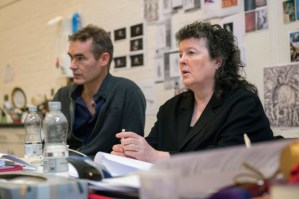Review: My Country: A Work in Progress (Dorfman, National Theatre)
This new play by Poet Laureate Carol Ann Duffy, takes place in the days following the Brexit vote and interweaves real public testimonials with speeches from party leaders
Rufus Norris has been quite explicit that he would be failing in his responsibility as artistic director of the National Theatre if he did not attempt to deal with the biggest change in Britain in a generation – the vote to leave the European Union. He has also been quite clear that the play he commissioned had to start by listening to the people of Britain – and had to end up being an effective piece of theatre. It sounded like a circle that could not be squared but in the end My Country is a far better work than we had any reason to expect.
It may not offer much in the way of revelation, but it is compassionate, funny and insightful. For that much of the credit most go to Norris’s collaborator, the poet laureate Carol Ann Duffy, who has shaped random interviews gathered from around the country into a coherent and highly effective whole.
Her conceit is that Britannia has convened a meeting of some of her constituent parts – Caledonia, Cymru, South-West, North-East, Northern Ireland, East Midlands – in order to discuss the significance of the Brexit vote. Her plea is that the representatives of the "spirits and hearts" of the land, will listen to what is being said; the audience are involved as witnesses to the words.
If it all sounds a bit grave, the flair of Norris’s deft and fleet-footed production is revealed from the moment that Britannia marches in, her plumed helmet poking out of the top of her shopping bag, and starts rearranging a bland conference room while switching the sound system through a selection of the national airs.
Each area is represented by a single actor, who in turn provides the many, varied voices of the region, speaking them verbatim, with all their natural hesitations and emphasis. Britannia herself mimics the politicians and leaders, including an uncanny blustering Boris and a splayed-legged Farage.
As the evening unfolds, familiar themes emerge, grouped by Duffy into clearly delineated sections; the EU, patriotism, hardship. Over and over again the sense that Britain has changed irreversibly for the worse is heard: in the voice of a shepherd who can no longer care properly for her flock as well as the woman who doesn’t see anyone like her among her neighbours. The sense of injustice – of the Somali refugee who is given luxurious accommodation while the hard-working Midlander is not afforded any help – runs alongside other voices that are ashamed of our new attitude to refugees. The text is even-handed.
Duffy herself intervenes to reveal Britannia’s weariness, and to carve a central section of celebration of difference – a feast where each constituent part of the land offers its own produce, its own dances, celebrates itself as part of a whole.
The play is often very funny, always very warm. The voices are gently treated, allowing the multiplicity of Britishness to fill the stage, encouraging empathy and a willingness to understand. By the close, when Katrina Lindsay’s set fills with yellow light as a new, different Britain dawns after the vote, there is a plea for good leadership, but not much more. This is a night for reflection rather than a call to arms.
The journey is interesting, however, and it is a pleasure to take it in the company of actors as good as Seema Bowri, Cavan Clarke, Laura Elphinstone, Adam Ewan, Penny Layden, Stuart McQuarrie and Christian Patterson who fill a small space with the whole of the disunited kingdom.
My Country: A Work in Progress runs at the National Theatre until 22 March before touring the UK.













